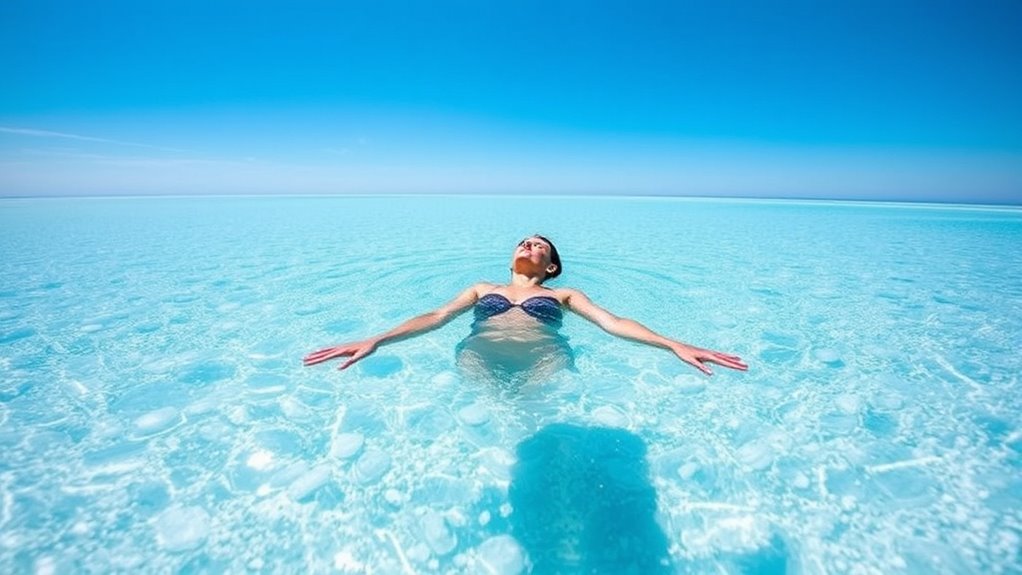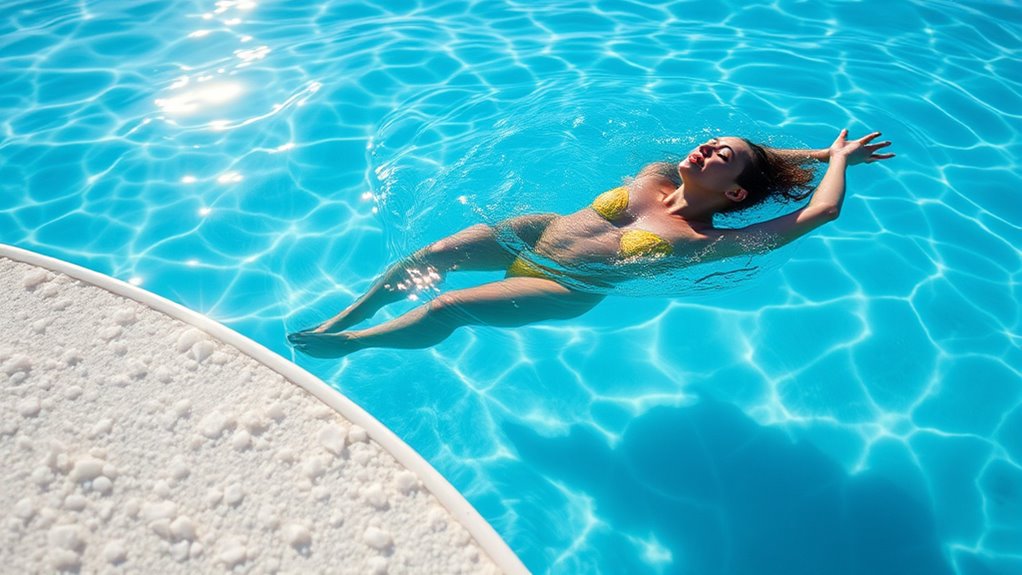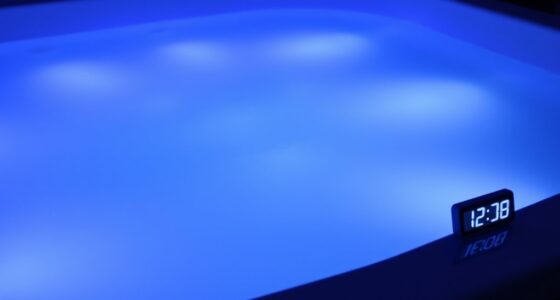Your floating experience is greatly affected by water salinity because salt increases water’s density. In saltier water, like the ocean or the Dead Sea, you’ll find it easier to float with less effort since higher density creates a stronger buoyant force. In freshwater, floating is harder because of lower density. Understanding how salinity impacts buoyancy helps explain why some waters support you more effortlessly—keep exploring to learn more about this fascinating relationship.
Key Takeaways
- Higher salinity increases water density, making it easier to float with less effort.
- Salt ions add mass to water, strengthening buoyant force on objects and bodies.
- In saltier water, individuals require less muscular effort to stay afloat.
- The buoyancy difference explains why places like the Dead Sea enable effortless floating.
- Watercraft float more easily and stably in saltier water due to increased density and support.

Have you ever wondered why objects float more easily in saltwater than in freshwater? It all boils down to the differences in oceanic salinity and how they influence water density. When you’re in the ocean, the high concentration of salt increases the water’s density compared to freshwater. This increased density creates a greater buoyant force acting on your body, making it easier to stay afloat. Essentially, salt ions in the water add mass without markedly increasing volume, so the water becomes heavier per unit volume. That’s why a person who might sink in a freshwater lake can float effortlessly in the ocean.
Saltwater’s higher density makes floating easier by increasing buoyant force.
Freshwater density is lower because it contains little to no salt. Without the added salt particles, freshwater has less mass in the same volume, which means it exerts less upward force on objects submerged in it. When you’re swimming in freshwater, you need to exert more effort to keep yourself afloat because the buoyant force isn’t as strong. This is why you often feel more weightless when you’re in saltier water; the higher oceanic salinity boosts the water’s density, providing more support to your body. It’s a simple yet profound effect of chemistry and physics working together.
The difference in water density caused by salinity isn’t just about personal comfort; it also affects how ships float or how swimmers experience the water. In saltier water, your body displaces a relatively smaller volume of water for the same weight, because the water itself is heavier. That’s why boats that are designed for ocean travel are often more stable and easier to float than those used in freshwater lakes. If you’ve ever been to the Dead Sea, you know how effortlessly you can float there—its salt concentration is so high that the water density is markedly increased, making buoyancy almost effortless. Additionally, water salinity can influence the effectiveness of water treatment processes and the design of water filtration systems.
Understanding this relationship helps you grasp why your floating experience varies so much between different bodies of water. The ocean’s high salinity means more oceanic salinity and dissolved salts lead to higher water density, giving you that floatation advantage. Conversely, freshwater’s lower density makes floating a bit more challenging. So next time you’re in the water, remember that the chemistry of the environment is working in your favor or against you, depending on the salinity levels. It’s a fascinating interplay of science that directly impacts how easily you can stay afloat, making your swimming or floating experience all the more interesting.
Frequently Asked Questions
Does Higher Salinity Improve Relaxation During Floating?
Yes, higher salinity can improve your relaxation during floating by enhancing float comfort. When salinity balance is ideal, the water’s density increases, making it easier for you to stay afloat effortlessly. This reduces muscle strain and helps you relax more deeply. So, a slightly higher salinity level creates a buoyant environment that promotes a more soothing and comfortable floating experience, allowing you to unwind completely.
Can Low Salinity Water Cause Skin Irritation?
Low salinity water can cause skin dryness, especially if you’re prone to salt sensitivity. Without enough salt to balance moisture, your skin may become more irritated or itchy. You might notice redness or discomfort after floating in less saline water. To avoid this, consider moisturizing regularly and monitoring how your skin reacts, especially if you have sensitive skin or a history of skin irritation related to salt exposure.
How Does Salinity Impact Buoyancy for Different Body Types?
Think of your body as a boat—your body composition and float density determine how easily you stay afloat. Higher salinity increases water’s buoyancy, so even if you’re more dense or have a different body type, you’ll find it easier to float. Lower salinity means you need a lighter body composition to float effortlessly. Your unique float density interacts with water salinity to shape your personal floating experience—embrace it!
Is There an Optimal Salinity Level for Therapeutic Floating?
Yes, there is an ideal salinity balance for therapeutic benefits, typically around 8-10%. This level maximizes buoyancy, helping you float effortlessly while soothing your muscles and joints. Too high salinity can cause skin irritation, while too low reduces buoyancy, diminishing the therapeutic effects. Maintaining the right salinity balance ensures you enjoy the full range of therapeutic benefits, making your floating experience more relaxing and effective.
Does Water Temperature Interact With Salinity to Affect Floating?
Water temperature and salinity fluctuations work together to influence your float. When water is around 93.5°F, your body feels nearly weightless, but if salinity levels change, that effect shifts. Temperature interactions can make floating easier or harder, depending on whether water is warmer or cooler. For example, cooler temperatures may reduce buoyancy, especially if salinity varies, making your floating experience less effortless and more challenging.
Conclusion
So, next time you float effortlessly, remember—salinity is the secret behind your buoyant bliss. It’s like nature’s invisible hand guiding you on a journey of weightless wonder. Whether you’re basking in the Dead Sea’s embrace or dipping into a freshwater pool, water’s salty secret shapes your floating experience. Embrace the magic, and let the salinity carry you into a domain where gravity takes a backseat—because in water, salt is your floating fairy godmother.










